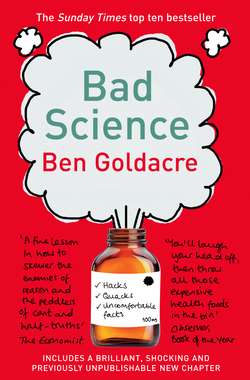Читать книгу Bad Science - Ben Goldacre - Страница 28
An ethical placebo?
ОглавлениеBut more than anything, the placebo effect throws up fascinating ethical quandaries and conflicts around our feelings on pseudoscience. Let’s take our most concrete example so far: are the sugar pills of homeopathy exploitative, if they work only as a placebo? A pragmatic clinician could only consider the value of a treatment by considering it in context.
Here is a clear example of the benefits of placebo. During the nineteenth-century cholera epidemic, deaths were occurring in the London Homeopathic Hospital at just one third of the rate as in the Middlesex Hospital, but a placebo effect is unlikely to be all that beneficial in this condition. The reason for homeopathy’s success in this case is more interesting: at the time, nobody could treat cholera. So while hideous medical practices such as blood-letting were actively harmful, the homeopaths’ treatments at least did nothing either way.
Today, similarly, there are often situations where people want treatment, but medicine has little to offer—lots of back pain, stress at work, medically unexplained fatigue and most common colds, to give just a few examples. Going through a theatre of medical treatment, and trying every medication in the book, will give you only side-effects. A sugar pill in these circumstances seems a very sensible option, as long as it can be administered cautiously, and ideally with a minimum of deceit.
But just as homeopathy has unexpected benefits, so it can have unexpected side-effects. Believing in things which have no evidence carries its own corrosive intellectual side-effects, just as prescribing a pill in itself carries risks: it medicalises problems, as we will see, it can reinforce destructive beliefs about illness, and it can promote the idea that a pill is an appropriate response to a social problem, or a modest viral illness.
There are also more concrete harms, specific to the culture in which the placebo is given, rather than the sugar pill itself. For example, it’s routine marketing practice for homeopaths to denigrate mainstream medicine. There’s a simple commercial reason for this: survey data shows that a disappointing experience with mainstream medicine is almost the only factor that regularly correlates with choosing alternative therapies. This is not just talking medicine down: one study found that more than half of all the homeopaths approached advised patients against the MMR vaccine for their children, acting irresponsibly on what will quite probably come to be known as the media’s MMR hoax. How did the alternative therapy world deal with this concerning finding, that so many among them were quietly undermining the vaccination schedule? Prince Charles’s office tried to have the lead researcher into the matter sacked.
A BBC Newsnight investigation found that almost all the homeopaths approached recommended ineffective homeopathic pills to protect against malaria, and advised against medical malaria prophylactics, while not even giving basic advice on mosquito-bite prevention. This may strike you as neither holistic nor ‘complementary’. How did the self-proclaimed ‘regulatory bodies’ in homeopathy deal with this? None took any action against the homeopaths concerned.
